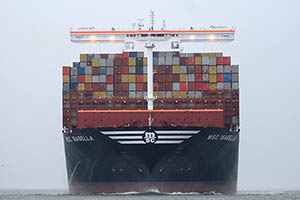Marine insurance: liability and risks covered
On this point, national and international legislation is in line, and the carrier's liability is the general rule. According to the latter, the carrier is subject to a presumption of liability, and is responsible for damage to goods in transit.
However, the carrier may avoid liability by invoking the existence of grounds for exoneration. Without getting to the specifics of numerous and various instances of exoneration, let us simply cite as an example the case of a sea carrier who exonerates themselves from liability when the ship hits a rocky bottom, causing a tear in the hull and resulting in damage to the cargo, while a pilot was in charge of the maneuver.
Marine insurance coverage
The main types of insurance plans available to transport professionals (forwarding agents, shipowners, charterers, ...), manufacturers and trading companies include:
 professional liability insurance,
professional liability insurance,- hull insurance,
- transported goods insurance,
- general average insurance,
- exceptional risks insurance.
Granted within the framework of voyage, subscription or open policies, marine transport insurance covers:
- damage to third parties for which the insured is legally liable,
- damage to transported goods for which the carrier is liable,
- total or partial destruction of the insured's property (ship's hull and marine faculties).
The voyage insurance policy covers goods on a specific route for a specific shipment and a specific risk.
The subscription or floating policy covers all cargoes carried by a given shipper within the limits and timeframes specified in the general and special conditions of the contract: all-risk cover or more restricted cover except (Free of Particular Average).
The open policy is suitable for shipments of the same nature spread over an indefinite period. When underwriting the policy, the insured party (importer or exporter) must inform the insurer of the total value of the goods and the number of shipments planned.
Read also | Carriage and marine insurance contract
Marine insurance: ordinary and exceptional risks
In marine transport, goods (cargoes and bodies) are subject to two types of risk: ordinary risks and exceptional risks. Each category of risk is covered by a specific policy.
Ordinary risks: They are risks caused by normal events to which transported goods are exposed, such as particular or simple damage and general damage:
- Particular or simple damage is material damage and loss of weight or quantity suffered by the insured goods during transport. This damage affects the goods of a single insured party, not the entire ship's cargo.
Damage may be direct: breakage, theft, anchoring, loss of quality, etc., or indirect, also known as fresh damage. The latter refers to additional expenses incurred to protect insured objects from damage or material loss, or to limit their extent. - General average refers to a common loss resulting from the ship's captain's decision to sacrifice, intentionally and reasonably, part of the cargo.
This decision must be taken by the master in order to avoid imminent danger or reduce its harmful consequences. This sacrifice, made in the interests of the ship and the marine expedition, must be borne jointly by the owners of the ship and the cargo.
The damage is apportioned by a surveyor appointed by the shipowner and the carrier to apportion general average. General average may be caused by any of the following events: fire, grounding, collision, etc.
Exceptional risks: exceptional risks insurance, also known as war risks insurance, is not included in ordinary risks insurance policies. Intended to cover the risks of civil or foreign war, terrorism, acts of sabotage, hostilities, strikes, riots and popular movements, etc., it has been designed to insure goods and ship hull against the risks of destruction due to theft, looting and other exceptional risks.
These risks are often caused by socio-political conflicts, which can result in very heavy financial losses for the owners of the goods or the ship.
Read also | Disruptions to international maritime trade